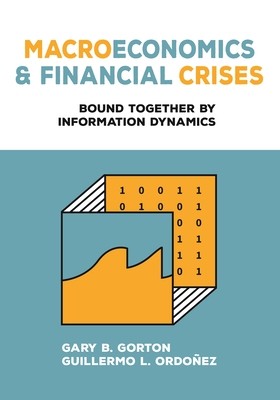
- We will send in 10–14 business days.
- Author: Gary B Gorton
- Publisher: Princeton University Press
- ISBN-10: 0691227012
- ISBN-13: 9780691227016
- Format: 17.8 x 25.6 x 2.4 cm, hardcover
- Language: English
- SAVE -10% with code: EXTRA
Reviews
Description
How financial crises are inherent features of macroeconomic dynamics
There are no bigger disruptions in the functioning of economies than financial crises. Yet prior to the crash of 2007-2008, macroeconomics incorporated financial crises simply as bad shocks, like earthquakes, failing to consider them as an intrinsic phenomenon of the evolution of macroeconomic variables, such as credit, investment, and productivity. Macroeconomics and Financial Crises rethinks how technological change, credit booms, and endogenous information production combine to generate financial crises as inherent and recurrent reactions to macroeconomic dynamics. Gary Gorton and Guillermo Ordoñez identify short-term debt, collateral, and information as common elements that are present in all financial crises. Short-term debt is a critical element for storing value over short periods without fear of loss, but there needs to be collateral backing the debt. Critically, the collateral should be such that no agent wants to produce information about its quality. The debt backed by such collateral is information-insensitive. Gorton and Ordoñez argue that, during a credit boom, as more and more firms get loans, the economy reaches a tipping point where information production becomes too tempting, disrupting short-term debt and cutting most firms out of the credit market. Showing how a financial crisis is an information event triggered by the dynamics of macroeconomic variables, Macroeconomics and Financial Crises provides new perspectives on the intricate relations between macroeconomics and financial crises.EXTRA 10 % discount with code: EXTRA
The promotion ends in 17d.06:21:52
The discount code is valid when purchasing from 10 €. Discounts do not stack.
- Author: Gary B Gorton
- Publisher: Princeton University Press
- ISBN-10: 0691227012
- ISBN-13: 9780691227016
- Format: 17.8 x 25.6 x 2.4 cm, hardcover
- Language: English English
How financial crises are inherent features of macroeconomic dynamics
There are no bigger disruptions in the functioning of economies than financial crises. Yet prior to the crash of 2007-2008, macroeconomics incorporated financial crises simply as bad shocks, like earthquakes, failing to consider them as an intrinsic phenomenon of the evolution of macroeconomic variables, such as credit, investment, and productivity. Macroeconomics and Financial Crises rethinks how technological change, credit booms, and endogenous information production combine to generate financial crises as inherent and recurrent reactions to macroeconomic dynamics. Gary Gorton and Guillermo Ordoñez identify short-term debt, collateral, and information as common elements that are present in all financial crises. Short-term debt is a critical element for storing value over short periods without fear of loss, but there needs to be collateral backing the debt. Critically, the collateral should be such that no agent wants to produce information about its quality. The debt backed by such collateral is information-insensitive. Gorton and Ordoñez argue that, during a credit boom, as more and more firms get loans, the economy reaches a tipping point where information production becomes too tempting, disrupting short-term debt and cutting most firms out of the credit market. Showing how a financial crisis is an information event triggered by the dynamics of macroeconomic variables, Macroeconomics and Financial Crises provides new perspectives on the intricate relations between macroeconomics and financial crises.

Reviews